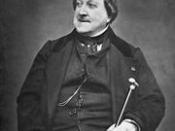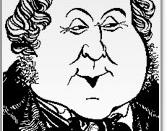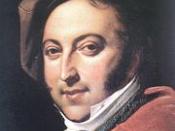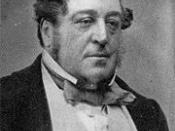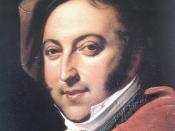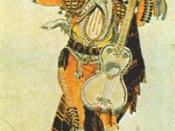Gioachino Antonio Rossini
By Crista Nelson
Gioachino Antonio Rossini, nicknamed 'Signor Crescendo' was an Italian composer who created 39 operas as well as sacred and chamber music. His best known works are The Barber of Seville, La Cenerentola, and William Tell.
He was born February 29, 1792, a leap year, into a family of musicians in Pesaro, a town on the Adriatic coast of Italy. His father, Giuseppe, was a horn player and inspector of slaughterhouses, his mother, Anna, was a singer and a baker's daughter. Rossini's parents began his musical training early, and by the age of six he was playing the triangle in his father's band.
In 1804 the Rossini's moved to Bologna to be closer to the center of musical life. At this time Rossini was frequently left in the care of his elderly grandmother, who was unable care for him properly so, they allowed him to stay with a local pork butcher part of the time, while his father played the horn in the orchestras of the theatres at which his wife sang.
During this time he had three years' instruction in the harpsichord from Giuseppe Prinetti.
After leaving Prinetti's instruction at the age of ten, he apprenticed as a blacksmith for a short time and then, found a congenial master in Angelo Tesei, who taught him to sight -read, to play accompaniments on the piano forte and sing. Important from this period are six sonatas a quattro or string sonatas composed in three days, unusually scored for 2 violins, cello and double bass.
The original scores were found in the Library of Congress in Washington DC after World War II, dated from 1804 when the composer was twelve. Often transcribed for string orchestra, the sonatas reveal the young composer's affinity for Haydn and Mozart, already showing signs of operatic tendencies, punctuated by frequent rhythm changes and dominated by songlike melodies.
Rossini's family was going through hardship at this time and he had to contribute to the family by singing in local churches and acting in local opera houses. He was good at his job but had a sense of humor about him which could easily cause offence to the audience of the other actors. His sense of humor did not cause him any harm though, because in the fall of 1805 at the age of 13 he had a stage role of Adolfo in Paer's Opera semiseria, Camilla.
Also at the age of 13 he composed several individual numbers to a libretto by Vincenza Mombelli, called Demetrio e Polibio, and wrote his first opera but it wasn't staged until several years later in 1812. In 1806, at the age of 14, Rossini became a cello student under Cavedagni at the Conservatorio of Bologna, and in 1807 he was admitted to the counterpoint class of Padre Stanislao Mattei. His insight into orchestral resources is generally ascribed not to the strict compositional rules he learned from Mattei, but to knowledge gained independently while scoring the quartets and symphonies of Haydn and Mozart. At Bologna he was known as "il Tedeschino" ("the Little German") on account of his devotion to Mozart.
In 1812, at the age of 18 his first opera La cambiale di matrimonio finally came to light in Venice through the friendly interposition of the Marquis Cavalli. This opera was one of seven that he wrote within the next 16 months of his life, all but one of these were comedies. This level of activity continued in the ensuing years. His first operas to win international acclaim came from 1813, while he wrote for different Venetian theatres: the serious opera, Tancredi, which showed a fusion of lyrical expression and dramatic highlights, with its clear melodies, breathtaking harmonic inflections and colorful orchestral writing, and the hilariously comical, L'italiana in Algeri, which moved easily between the sentimental, the patriotic, to the absurd and sheer lunacy.
He wrote two other operas for Milan which were less successful. But in 1815 Rossini went to Naples as musical and artistic director of the Teatro San Carlo, which led to a concentration on serious opera. While there he was also allowed to compose for other theatres, and from this came two of his supreme comedies, written for Rome, Il barbiere di Siviglia (The Barber of Seville) and La Cenerentola.
The Barber of Seville which was first introduced in 1816 is said to be the greatest Italian comic opera of all time. When it was first introduced though, it was a failure, but it quickly became admired by all who saw it. In the following year 1817, La Cenerentola became the center of attention. It was a charming tale of a scullery maid who becomes a royal maiden.
After the success of these operas, he moved on to write operas for Naples. One of which marks the maturity of his ability to write more dramatic themes was the third act of his Otello. In this period he also abandons traditional overtures, possibly to involve the audience and make the drama more interesting. The leading soprano in Naples was Isabella Colbran, who was the mistress of the impresario became involved in Rossini's operas and soon fell in love with him and married him in 1822.
During this period in Naples he also wrote several masterpieces which include: Maometto II (1820), and Semiramide (1823), After Rossini and his wife returned to Bologna for a short stay and then left for London and Paris where he became the director of the Italian Theatre. There he composed for the Theatre as well as for the opera. Much of the music he composed in this period were adaptations of existing operas, but in 1829 he wrote his last and one of his most famous operas, Guillaume Tell (William Tell). This opera was widely regarded as his greatest opera, it was had a very elaborate orchestration with many ensembles, wonderful ballets and processions, intertwined into the French tradition with a new harmonic boldness, that had never been seen before.
After this he retired at the age of 37, he and his wife Isabella left Paris in 1837 to live in Italy. Isabella died in 1845, and the next year he married Olympe Pelissier, which was his mistress of 15 years. During this period he was very ill and did not write much , but Olympe nursed him through his sickness and they went back to Paris where he wrote a few more pieces for friends or for the church. Rossini died at his country house at Passy on Friday November 13, 1868 and was buried in Père Lachaise Cemetery, Paris, France. In 1887 his remains were moved to the Basilica di Santa Croce di Firenze, in Florence, where they now rest.
Works Cited
GNU Free Documentation License. (n.d.). Rossini. Retrieved August 20, 2008, from Wikapedia: <http://en.wikipedia.org/wiki/Gioacchino_Rossini
Boynick, M. (1996). Gioacchino Rossini. Retrieved August 18, 2008, from Classical Music Pages: <http://w3.rz-berlin.mpg.de/cmp/rossini.html>
Osborne, R. (1986). Rossini. Boston: Northeastern University Press.
Servadio, G. (2003). Rossini. New York: Carroll & Graf Publishers.
<http://italianopera.suite101.com/article.cfm/italian_composer_gioachino_rossini>
